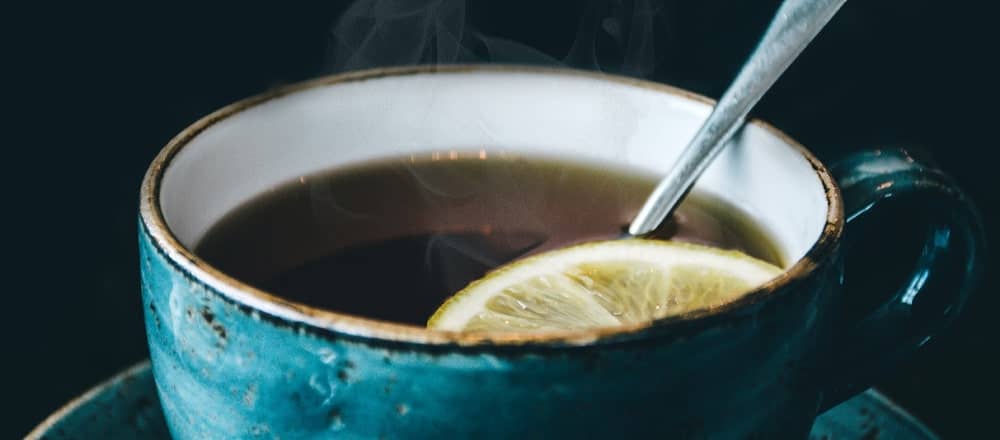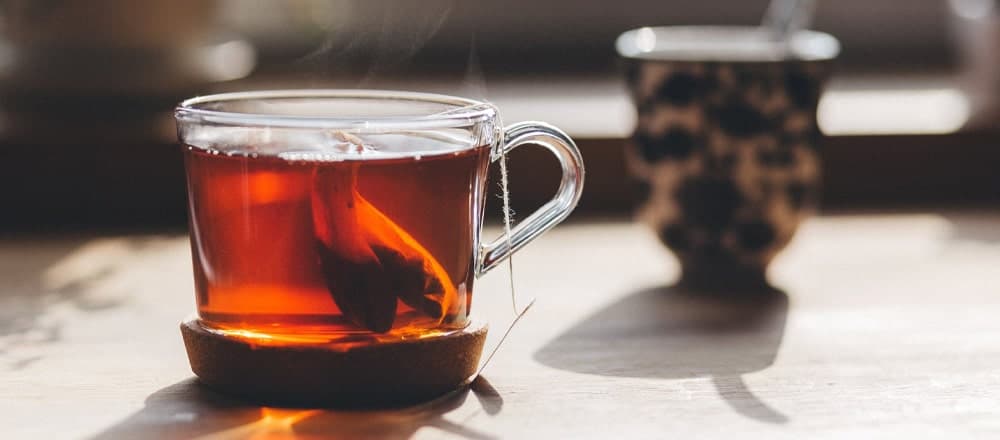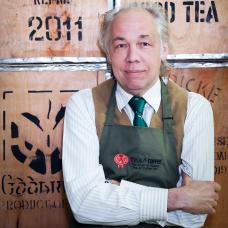Does Decaf Tea Have Caffeine at All?

A common misconception is that Decaffeinated Tea (and Fresh Coffee, for that matter) is 100% void of caffeine. The truth is a little more complicated than that. Indeed, we’re often asked, “Does Decaf Tea have caffeine at all?” and we have to explain that yes, it does, despite what it says on the tin. But how? And why? This is what we’ll be exploring in the following article, so please keep reading.
You will learn here how much caffeine in Decaf Tea remains after its processing, as well as why Decaf Tea caffeine content exists in the first place.
Even better is that, once you know the facts, you can browse and buy from The Kent and Sussex Tea and Coffee Company. We take pride in packing every Loose Tea, Tisane and Coffee fresh to order, thereby ensuring quality and consistency.
Table of contents

Why is There Caffeine in Decaf Tea?
Allow us to start with “why” because, well, it’s in the name, right? Decaf Tea shouldn’t have a single ounce of caffeine remaining otherwise it isn’t living up to its promise. We understand the frustration.
However, the bottom line is that the Camellia sinensis (Tea) plant is one of sixty plants to contain the stimulant, the same as Coffee (Coffea) and Yerba Mate (Ilex Paraguariensis).
Removing Caffeine in Tea and its counterparts requires further processing known as Decaffeination. There is no such thing, in other words, as a naturally occurring Decaf Tea or Coffee.
We’ve talked about the four primary methods of Decaffeinating in another article. What we want to look into in this particular blog is, “Does Decaf Tea have caffeine AFTER decaffeination?”
While extracting caffeine has become increasingly efficient in recent years, it is all but impossible to remove 100% of the substance. Some residue will, inevitably, remain.
Try not to worry, though, as when we say “residue,” we mean it. If you consider yourself caffeine-sensitive or, perhaps, you’re pregnant and hope to cut down your intake, brewing Decaf Tea is still a relatively safe option.

How Much Caffeine in Decaf Tea?
The chances are you’re now wondering, “How much caffeine does Decaf Tea have?” The answer, in short, is “little” – but you probably want to know the specifics.
The reality is that it depends. It depends on the Type of Tea you choose, for example – though this isn’t the defining factor. While caffeine in Decaf Green Tea might be slightly different from Decaf Black Tea’s caffeine content, there is a bigger picture.
The most important consideration to understanding the levels is the Decaffeination method applied to the leaves. The Co2 Process, which is the safest and most efficient method – as well as being the most commonly used – extracts between 96% and 98% of caffeine.
This results in around 5-10 milligrams remaining in your brew. Such is the case with most of our Decaf products.

Are There Caffeine-Free Alternatives Available?
You have the answers to, “Has Decaf Tea got caffeine?”, which is a yes, and “How much caffeine in Decaf Tea?” – as mentioned above. There is one more option, however, and that’s to move away from “real” Tea and instead have a Herbal Tea or Fruit Tisane Tea.
These varieties contain no leaves from the Camellia sinensis plant, meaning they’re only honorary Teas and, therefore, caffeine-free.
From Rooibos Tea to Hibiscus; Tropical Fruit Tisane to Turkish Apple Tea, the possibilities are almost endless. Best of all, you have no need to worry about caffeine content in any of them, bar the exception of Yerba Mate. When even the slightest energy boost from your cuppa is a big no-no, then, your first choice should be to go down the Fruit or Herbal Tea route.
Conclusion – Does Decaf Tea Have Caffeine
And there you have it: the “why,” the “how much” and the “what about this instead?” explained. All that’s left is for you to decide, “What next?”
We hope that you find something to love here at The Kent and Sussex Tea and Coffee Company. Our vast selection boasts many types of Decaffeinated Tea and Coffee, as well as dozens of Herbal and Fruit Tea varieties. You won’t be disappointed.

 Loose Leaf Tea
Loose Leaf Tea Pyramids
Pyramids Tea Bags
Tea Bags Africa
Africa Assam
Assam Ceylon
Ceylon Chinese
Chinese Darjeeling
Darjeeling European
European Indian
Indian Japan
Japan Nepal
Nepal South East Asia
South East Asia Ayurveda Tea
Ayurveda Tea Black Tea
Black Tea Chai Tea
Chai Tea Flowering Tea
Flowering Tea Fruit Tisanes
Fruit Tisanes Green Tea
Green Tea Herbal Tea
Herbal Tea Matcha Tea
Matcha Tea Oolong Tea
Oolong Tea Organic Tea
Organic Tea Pu erh Tea
Pu erh Tea Rooibos Tea
Rooibos Tea White Tea
White Tea Asian Coffee
Asian Coffee Caribbean Coffee
Caribbean Coffee Central American Coffee
Central American Coffee South American Coffee
South American Coffee Coffee Blends
Coffee Blends Decaffeinated Coffee
Decaffeinated Coffee Espresso Coffee
Espresso Coffee Ethically Sourced Coffee
Ethically Sourced Coffee Flavoured Coffee
Flavoured Coffee Organic Coffee
Organic Coffee Single Origin Coffee
Single Origin Coffee Chocolate 1
Chocolate 1 Chocolate 2
Chocolate 2 Chocolate 3
Chocolate 3 Chocolate 4
Chocolate 4 Chocolate 5
Chocolate 5 Chocolate 6
Chocolate 6 Chocolate 7
Chocolate 7 Chocolate 8
Chocolate 8 Chocolate 9
Chocolate 9 Loose Tea Filters
Loose Tea Filters Tea Accessories
Tea Accessories Tea Bricks
Tea Bricks Tea Caddies
Tea Caddies Tea Caddy Spoons
Tea Caddy Spoons Tea Gift Ideas
Tea Gift Ideas Tea Infusers
Tea Infusers Tea Strainers
Tea Strainers